20 years ago this week, India and Australia played one of the greatest Test matches in cricket history.
Sreehari Nair relives the sound and the fury of that unforgettable game at the Eden Gardens.
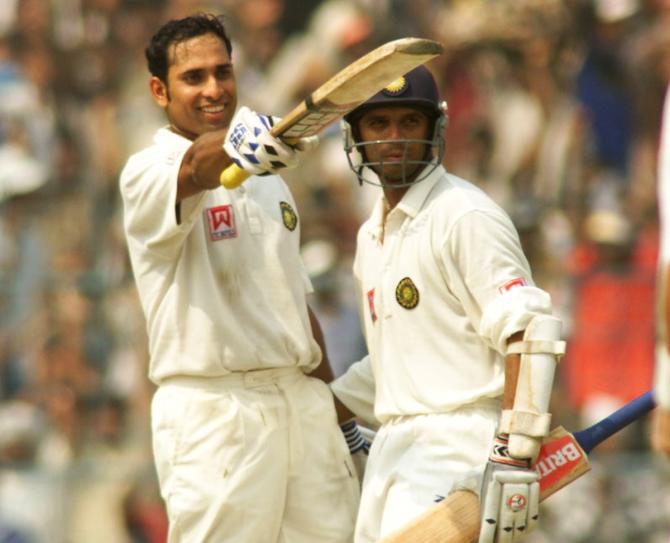
What would history be without its bit players, without its glorious extras?
The messenger who arrives on foot to deliver the bad news and ends up with a bayonet in his heart; the leper at the royal gate who performs amusing sleight-of-hand tricks for troops ready to go to war; the anonymous poet of the town square whose mad utterances are subsequently re-packaged for the world as wisdom for the ages; the too-proud-to-get-photographed sea captain setting off on a doomed voyage; the technician who does the final checks on the screws and who later that night, standing in his kitchenette, raises a glass to himself when it is announced on TV that the space shuttle has made a successful landing.
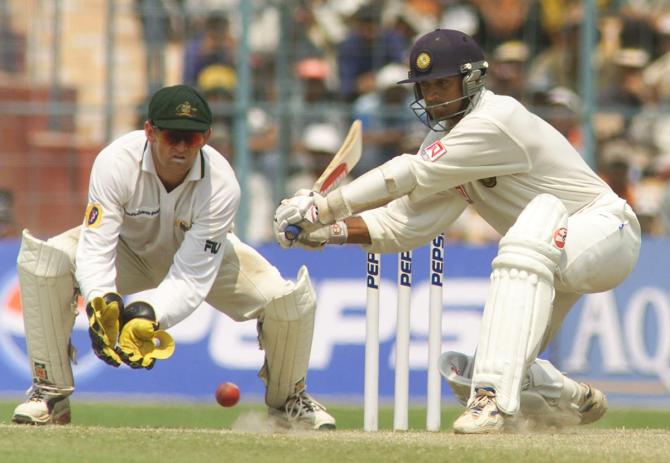
This particular character-type, nameless, faceless, featureless, was on my mind as I thought back to the great India-Australia Test Match of 2001.
Yes, the closing moments of that game were all too powerful: The Eden Gardens covered in fire and smoke (newspapers burnt: death to the litterateurs, all hail the sportsmen!), Glenn McGrath walking back to the dressing room grinding his teeth, Tony Greig's voice as always competing with the voice of the legions, and poor Sarandeep Singh trying desperately to join a team huddle that had left the Gardens and was back on some childhood's street.
The above imageries and sounds are lodged, somewhere in my spine, but I'll use this occasion to conjure up a few minor figures.
I am thinking of that policeman who rose up in exultation and then, as if reminded suddenly of his duty, turned around to regulate the crowd.
In an alcove of my mind, a picture comes into view, of an old radio operator, Bengali surely, wearing a dental plate perhaps, sitting in the Akashwani Bhavan bang outside the Eden Gardens, fiddling with and cursing the controls on his board, as he makes the flow of weather-reports break up in news of India's improbable victory.
I am compelled to mention here that boatman, who lazily picks at the words of a dirty song, while he pushes the waters of the Hooghly with his oars, indifferent to the bedlam that has been unleashed just 3 kilometres away.
Chronicles of momentous events are apt to giving you the grand marches and leaving out the small dances that happen on the side.
But this is a piece of history that becomes fun to revisit when you take a fair measure of precisely those small dances, those asides, those innocent subtexts, and those subtle shifts of power.
And so, assuming that you too have a taste for mischief and heresy, I am going to hold up this sacred crystal of our pop culture to a slightly different light.
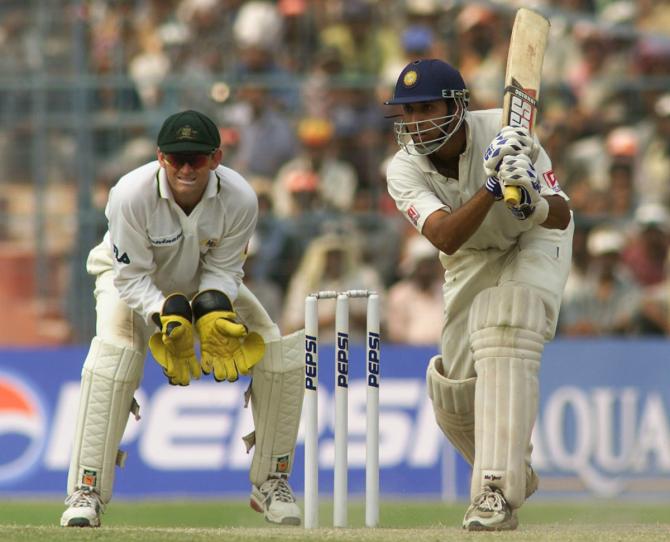
The game, I believe, turned, not on the fourth day -- when V V S Laxman and Rahul Dravid batted for close to 7 hours and ensured that Australia had to do more than just take strike again: the greatest ever Test team was also presented with a fourth innings target that was at once towering and beguiling (The sort of target that can weigh down the unexceptional, and offer marrow to the ambitious).
Oh no, the Kolkata Test Match of 2001 turned on the morning of the third day, when, with India reduced to 129/9 in their first innings, Laxman and Venkatesh Prasad added 42 runs for the last wicket.
These weren't 'crucial runs' -- as the truism goes -- but they provided the setting for Laxman, his muscle memory, his casual genius, and his banana-plant-caught-in-a-hard-weather-like batting stance to merge with the air at the Eden Gardens.
Tail-enders have historically, by virtue of swift cameos or extended special appearances, played striking roles in unforgettable test matches (think Ian Meckiff in 1960; think Maninder Singh in 1986; think Lee and Kasprowicz in 2005; think Jack Leach in 2019), and while Prasad may not have been a great No 11 batsman (he was no Ishant Sharma, who is our grittiest No 11, arguably), on March 13, 2001 Prasad did stand his ground as his partner went about mastering the air around him.
This air, that gave every sentiment of the beginning of summer, came from the Hooghly, mixed with the electronic air from the radio station, in it was the slow murmur of an apathetic crowd looking for nothing more than small consolations and the dull jargon of TV commentators, and VVS sculpted this air into proper shape, made it sing for him in that small period between Venkatpathy Raju's dismissal and his own wicket, and the air never stopped singing his praises.
Little by little he courted the air, turned her into his companion, his muse, his mistress, and she answered, making the ball drift just right, speeding the ball up or slowing it down, in a manner that would please her man, who hooked, glided, lofted and drove, his cells engaged in quick pas de deux with her molecules.
This, like I said, was Day 3, but the chance for greatness, whether he coveted it or not, seemed to pursue Laxman in that match.
He had, for instance, almost got India's expedition underway -- by holding on to an edge from Michael Slater, only to discover that his captain had 'overstepped' on the threshold of first blood.
That was opening day, March 11, 2001, when the Australian supporters matched the Indian supporters roar for roar, when Umpire Peter Willey like a severe Christian had to ask a doughboy-faced Zaheer Khan to keep his follow-through in check, and when the freshly erected advertising boards around the stadium sent forth news of how our country's collective unconscious was changing.
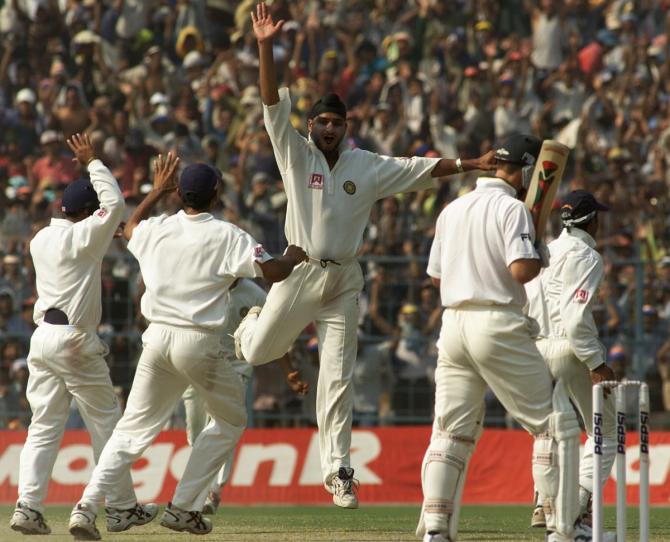
Confession: I am getting to a point in my life where I can't sit through a cricket classic from the vault without paying close attention to the advertising boards that were featured in that match.
As I see it, the album of billboards that fence a cricketing encounter tells you a lot about the country hosting the game, about the many paradoxes that drive its economy, the conflicting attitudes prevalent at the time, it talks about the virtuous image the country wants to project of itself and the devil figures that are out to expose these image-building efforts.
The 1992 World Cup, for example, had Benson & Hedges and Quit (an agency promoting 'a tobacco-free Victoria') placing their hoardings next to each other.
There's a holistic view of an age that comes through when you watch poised, dispassionate men in whites surrounded by advertisements of everything from Foster's to Prudential Insurance with messages from Metaxa, Esso, and Wonderfuel Gas splattered in between.
Cricket can be a lonely game but a bit of Brut Faberge for your vanity and the Sunday Telegraph for your social-conscience does spice things up.
The concept of the nation State starts to seem absurd when you watch incongruities like a hoarding of Australian Airlines at Trent Bridge, and that of British Steel at the Sydney Cricket Ground.
By the time we got to Kolkata 2001, cigarettes could not be advertised in India, and so other kinds of addictions had to be brought in to keep the balance.
The billboards at the Eden Gardens on those five days spoke of our explicit and unvoiced dreams, our growing need for speed, our ever-ballooning self-regard, and our many contradictory impulses; the billboards spoke of a country slowly moving past the savings mentality into the arena of splurging and risk-taking, past the need for a comfortable quilt into the desire for long electric nights illumined by the fires of neon; the billboards had on them names that have since gone on to achieve bigger things, success stories yes, but also those whose plans were either transfigured or shattered by time: Samsung and Bharti Enterprises, Sharekhan, Hero Honda and Wagon R, Hayward's 5000 and Pepsi and Aquafina, Taj Bengal, Sonora Tiles, Pizza Hut, Vivita, and Roofit Mix.
On the field, this capitalistic pride and self-deception gave to the contest a distinct colour.
A country for which a new narrative was being prepared -- one with a particular interest in wiping away the pain of those years when India's inherent decency was interpreted as its meekness -- was now self-consciously playing the aggressor, and at junctures where aggression didn't just seem excessive, but also misplaced.
I have a weird feeling that international teams today see every Indian victory as a victory for the game ('When India wins, everybody associated with cricket wins as well'), but Kolkata 2001 had all the qualities of an uprising, and by extension all the qualities of a sad comedy.

When Umpire S K Bansal adjudged McGrath Leg Before Wicket on the last day, pointing McGrath toward his fate as it were, it seemed less a decision and more a verdict delivered by a hanging judge: The pavilion, the gallows!
In that one instant, India's position in the world of cricket swung dramatically, it shifted from the time Umpire Vikramraju had (erroneously) sent off Maninder Singh to create the Drawn Test of 1986 and then declared, 'I am proud of that decision, and proud to be a part of history' to Bansal whose finger of fury appeared to be saying, 'Proud of this decision, proud to be a part of history, and proud most of all that I ministered the final rites of a famous Indian conquest.'
Even as this New India, with a new set of stimulating bad habits, asserted itself, Old India sneaked through every now then, parading those Old Indian Tricks, the Indian Cunning gleaned from our gullys and our mohallas.
How else do you account for Nayan Mongia coolly marking his guard after edging one from Michael Kasprowicz?; a classic case of a sportsman knowing when to get in touch with his inner weasel.
That old noble India full of poetic self-doubt also made itself evident in Sanjay Manjrekar's voice, his synapses firing blanks -- praising Venkatesh Prasad's success against left-handers just before Hayden punched the bowler for a boundary, or praising Zaheer Khan's sharpness just before he sprayed one down the leg side.
Criticising Manjrekar's commentary has become rather fashionable, but my two cents on this subject: I think the dude gets a lot of flak simply because he is adventurous with his opinions and does not limit himself to easy deductions, off-the-rack poetry, or the most harmless cliches of cricketing prose.
Even in the Test Match we are presently circling, SM, a juvenile back then in the world of broadcasting, showed a bullfighter's instinct for risking failure even as other *experienced* commentators comforted themselves with 'Lightning-fast outfield'; 'The noise is deafening'; Edged and Taken'; 'When he hits, it stays hit'; and the most soul-killing one of them all: 'Cricket is the real winner'.
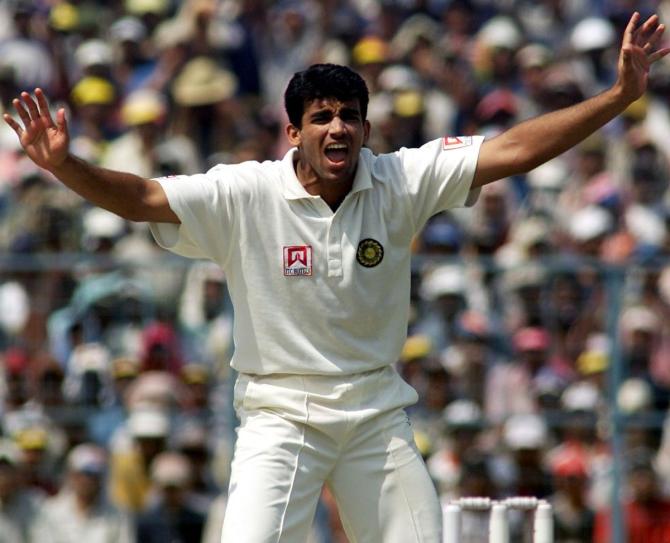
This foul cud of cricketing cliches was regurgitated in the presentation ceremony as well, when Ravi Shastri and Sourav Ganguly entered into a game of 'Let us see who can squeeze the most out of one adjective.'
'A fantastic win for India, Sourav?'
'Yeah, to win the test match after being asked to follow on shows how tough the guys are, and it's fantastic to watch the boys play. It's going to boost the morale of the side, and it's been fantastic.'
'The performances of the youngsters augur well for India's future?'
'Yeah, Laxman, Harbhajan, and Rahul all contributed. It's been a good team effort, and the way we came back, it was fantastic.'
'Many congratulations, Saurav. Fantastic performance.'
Yes, this was a country that had metamorphosed into an economic lion of sorts, in a relatively short time at that, but with a vocabulary that said it didn't feel like a lion.
In essence, this was a country suffering from an Identity Crisis, but one that didn't know the term yet.
Identity crisis was the sort of thing the Australian team hardly suffered from.
Steve Waugh's Unbeatables came to the City of Joy (and Joyous Rage) on the back of 16 consecutive Test wins and trumpeted its state of mind by scoring its first 24 runs in boundaries.
I don't think you would understand completely the magnitude of India's fightback in that game without internalising certain passing images from the first three days -- such as Michael Slater hoisting into the stands, the last ball before lunch on Day 1, and then using the momentum of his stroke to get himself to the dressing room.
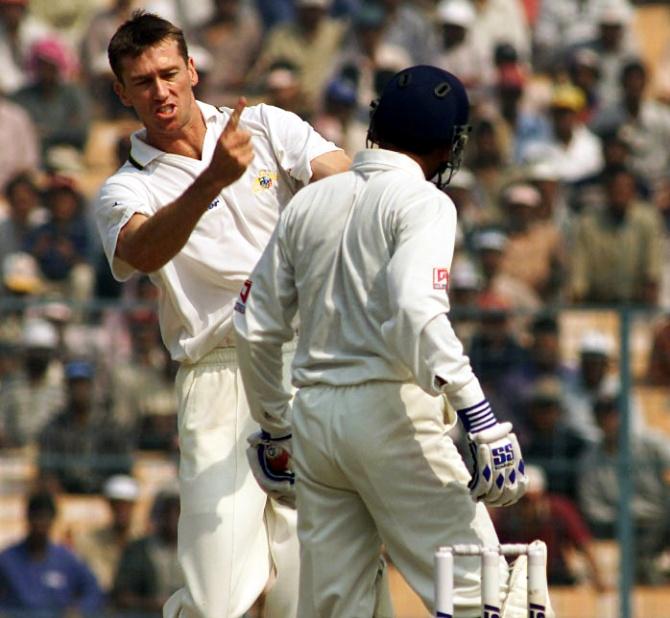
The first three days were the least interesting days of the test match by general agreement, relieved by Harbhajan's on-and-off talent for beating his prey in flight and Tony Greig's insistence on calling him Harbhajan Zing, given an hour of excitement by Laxman and Prasad with the latter doling out generous batting advice, buoyed up by the class of the Australian bowling attack and its gift for sucking the lifeblood out of enthusiastic home crowds, jolted by the surprise of Laxman’s sudden promotion as India's Number 3.
The sight of V V S Laxman walking out to bat in the second innings of the Kolkata Test of 2001 feels comparable now to the legend of Fidel Castro coming down the Sierra Maestra to take on Batista and his evil empire.
There are men who achieve greatness through sustained effort, for whom chasing greatness is their life's work, and there are men upon whom greatness gets thrust because they show the imagination to seize key moments in history and embody them: Laxman most definitely belongs to the second category.
I have every reason to believe that VVS approached that epic knock of 281 as a continuation of his knock in the first innings.
The order to 'follow on' must have rung in his ears as a permission to 'keep going'.
He seemed to have banished from his mind the poor umpiring decision that cut short his effort on the morning of the third day, banished from his mind the time he had to sit back and watch S S Das and S Ramesh script a minor resurgence, banished from his mind even the 10 minute gap between innings.
The air was our Hyderabadi's for the taking and off he went serenading her once again.
To the first delivery he faced in the second essay, Laxman played a forward defensive shot and the ball wobbled off to the leg-side.
In that willed exhibition of mistiming, there was none of the nervousness one associates with taking guard again; in point of fact, it was the kind of dead shot a batsman is known to play while gathering his thoughts after a drinks break.
The Australians, too, by not having fielders at Laxman's throat (and this may have been a tactical error) treated him like someone who had already spent decent time in the middle.
Ergo, when Laxman crossed 50 for the second time that day, in his head he must have toasted to a century.
On that day, he stepped out and smoked Shane Warne twice, once with the turn, and the second time against the turn.
And on both these occasions, the look on Warne's face betrayed his powers of premonition.
Now that was the crucial story of Shane Warne's career: There were days when he could be taken to the cleaners and still look confident, and then there were days when a batsman would take Warne on and he would look clueless and in awe of his oppressor.
Like those celebrated Irish gamblers, Warne had a wonderful sense of battles he was destined to win, and on those two days in Kolkata, his open mouth, that rubbing of his lower lip, his seemingly electrocuted hair, and his inattention to his shirt-sleeve (when he was dominating, Warne's sleeve symbolised Good Fashion Sense) suggested that the champion bowler was ready to pull out a white handkerchief and wave it.
I have often felt that champions are by nature superstitious, and Warne, whose respect for mystery was immense, understood very early on in the Test that Laxman had the force on his side.
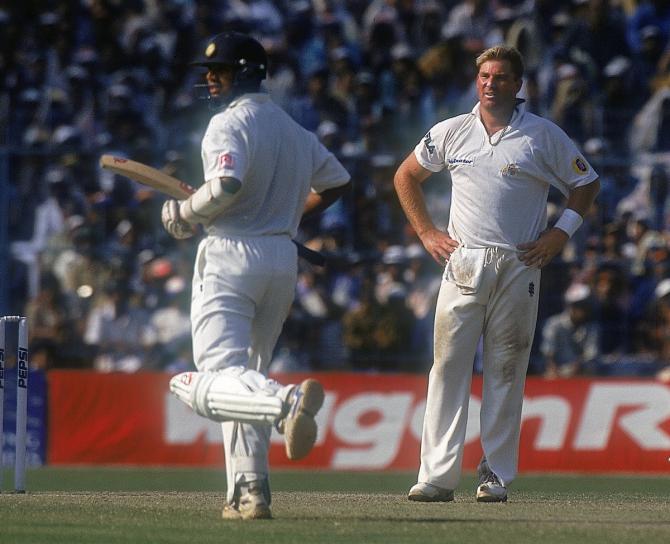
So unassailable did Laxman feel in the middle that he sauntered to his 100th run, and was almost caught short of his crease.
So effortless was Laxman's approach that every time Mark Waugh, another casual genius, came on with his relaxed off-cutters and his beach glasses, it was as if hot Eden Gardens had temporarily stopped playing host and the game had ascended the Kingdom of Cool: Where a nice breeze blew always and plentiful waters ran, and where men just lazed around all day and came back home with a host of records to their name.
This is good, this talk of grace and elegance, but revolutions don't receive fulsome mentions in history books unless they are sealed in blood.
Castro's descent from the Sierra Maestra wouldn't have counted for much if it weren't for the attack on the army-post at La Plata some days later, his first strategic victory so to speak, and after he had lost 63 of his 82 men.
That response demonstrated what a calculated offensive can do, how it can throw even the greatest of juggernauts into disarray.
In the Kolkata Test of 2001, India delivered its edition of the shocking offensive on the fourth morning, when the first 10 overs sent down by McGrath and Gillespie were taken for 7 runs per over, with the first session yielding close to 130.
Their chief military base was severely dented in those two hours, and Australia never really recovered from the attack.
Another unremarked facet of that landmark partnership is that its peculiarly pulverising quality derived from the fact that neither Laxman nor Dravid were natural clearers of the rope.
I have long believed that for an Indian team batting at home, boundaries are a deadlier form of assault than sixers, and you only have to rewind the tapes of the Kolkata Test, and dive in Zelig-like, to understand what I am saying.
Picture yourself as an Australian fielder on the fourth day of that Test. Imagine having to chase after a superbly placed and timed stroke once, twice, and sometimes three times in an over, and having to confront a thousand Indian heads bobbing in the stands, with no true knowledge of the game but rejoicing nevertheless at your misery, showing off their pearly (a gold filling among them, now and again, to compound the issue), displaying a snarky punchline or two on their placards, carrying little ones on their shoulders as if this were not a professional sport but a weekend fair, and unsuitably bringing patriotism into a contest that existed beyond such populisms in the realm of pure body.
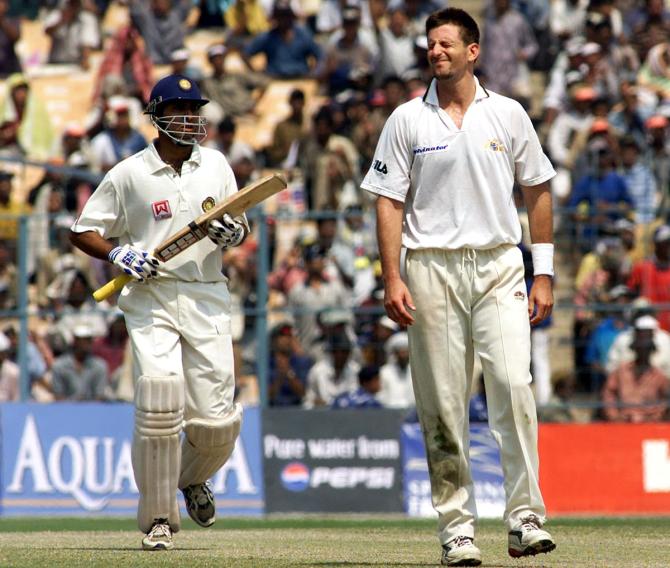
In India, for any visiting team, the exhaustion that comes about when chasing a ball that's trickling away to the boundary must cut far deeper than what comes about when a smack-ass hit gives you no time to react as a fielder.
I remember clearly that, by and by, on the fourth day, the Aussies had stopped giving the ball chase and instead would ask for it to be thrown back into play.
A reasonable strategy indeed, because those sprints to the boundary were revealing a too-wide psychic separation between what was happening on the field and how the will-do-anything-to-be-stoked crowd was reacting to it.
It was, however, the maddening, the maddeningly impossible crowd that gave psychic ammunition to Laxman and Rahul Dravid.
I am thinking particularly Dravid whose playing life was torn between his desire to make cricket the sole domain of those who genuinely care and his having to contribute toward all the idolatry, showmanship, instant gratification, fast cheques, and television rights that by early 2000s had become the game's economic mainstays.
Leave it to Dravid and he may get a bill passed which insists that all cricketing coups have the same lineaments as Kapil Dev's odyssey at Tunbridge Wells: No TV footage; hardly any spectators; set up to be passed down the generations like oral poetry.
Inside India's greatest No 3, one could sense lurking a loner perfectionist's secret wish to have nobody, nothing, no medium, come between him and the honing of his craft.
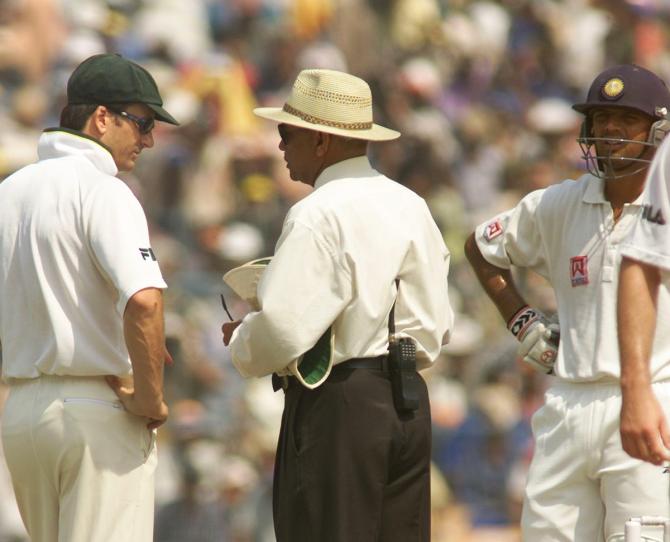
Kolkata 2001 was when Dravid managed to, somehow, divest his face of that bland reliability and acquire a look of electric intensity.
His career up until then was a series of comebacks, and this time he was coming back to prove that he too had the stuff of showbiz, that he could play the big hand and do it like a celebrity.
The first time he took off his helmet in the course of that 180, it felt like a Westerner's pragmatic response to a rifle-wielding gunman; the gunman being McGrath, smilingly threatening to run him out.
The second time the helmet came off, after his century, he was taunting those pundits in the dressing room who had demoted him, asked him to walk out at six instead of three. But in both these instances he was behaving like a man not used to being noticed, and his body showed it.
You could tell that he was imitating the outside of a star -- the inside was still full of dispassionate thirst for competence.
I cannot think of a modern-day cricketer less image-conscious than Dravid.
In an age where famous willows were customarily decorated with power sponsors -- MRF or CEAT or Reebok or Adidas -- our man walked out with a sticker of Britannia on his bat.
There was the equivalent of someone hurling a can of sardines in the midst of a grenade exchange.
By the time he got to 150, the raise of the bat had gone back to being a mere formality.
It was as if he was saying to the world: 'Have proved my worth. Now please let the loner be.' Batsmen grow in wit as they grow older at the crease; Dravid did not -- he grew more and more shy and off to the side.
In Laxman's smooth away-from-the-body caresses, we re-lived our fantasies of the outlaw who breaks all rules.
Every time Dravid got behind the line and hit one in the V, we got our version of the cynical hero who knows both sides of the law but still does right by everyone.
So they soldiered on, two very different kinds of leading men, acting out one of sports' most astonishing tales of underdog rebellion.
As they rode off into the sunset together you could not help but wonder: For an audience treated to such unmitigated brilliance, what must lie at the end of it all if not boredom?
When brilliance seems to be in large supply, and it seems to be stretching ad infinitum, don't we, passive onlookers, feel just a little dull inside?
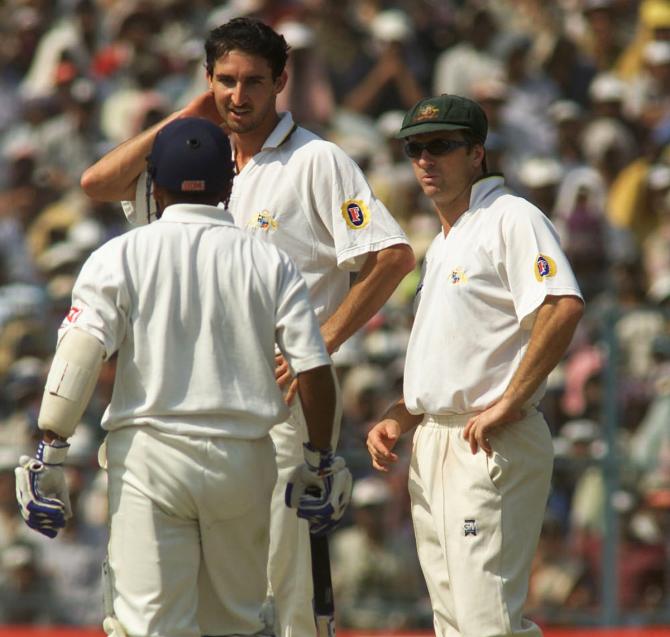
Flags were out when Harbhajan dismissed three in three deliveries, they were out in huge numbers when India went past the score necessary to make Australia bat again, but by the end of the fourth day all flag-waving sentiments had been used up: There in the stadium was the sound of tired legs searching for familiar cocoons, followed by a hushed applause, and finally a sigh of relief.
Then, a wave of gratitude came over the crowd, and it came over those of us parked in front of our television sets.
We felt grateful to be released from the grip of brilliance, grateful that we could go back to living our mediocre, imperfect lives.
The Dravid-Laxman show had carried the Aussies beyond irritation, beyond dread, beyond grudging respect even.
They were now performers stranded in a nightmarish play: a cruel satire which, if it hadn't been so cruel, would have been deeply funny.
Coming into the game, Waugh's men had amassed that look of Crack Management Teams; the look of cool killing machines and unsentimental executors of plans.
Now, a different glow emanated from them, a glow that appears after the sweat of dilemma has been washed away, after one has made peace with one's situation. In short, the Aussies' helplessness reached out to us.
We could offer a glance at Michael Slater and forgive his antics in the Mumbai Test of thirteen days ago.
Watching him wince on the field, it would not have been entirely inappropriate to think that this roguish man too was some mother's sweetheart, a mother who must have borne him in her arms and in her heart, who must have packed extra snacks for little Michael to consume after school, before practice.
Yes, the Aussies looked human, for a change.
Every single one of them had a wry smile on, everyone except Steve Waugh, the Australian cricketer with the least respect for irony.
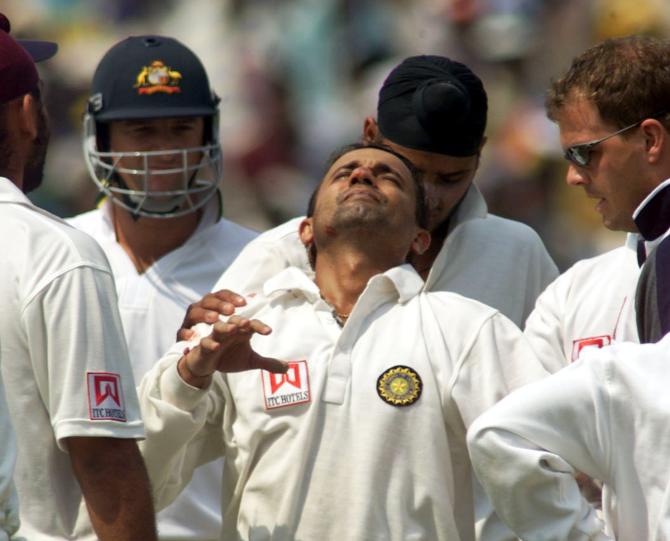
In cricket, few figures are as frustrating as a captain who is not gifted in the area of humour, and Steve Waugh's humourlessness, I am convinced, did contribute in great measure to so many Australian cricketers (past and contemporaries) having a low opinion of him.
Waugh wasn't a bad sport, not really. It's just that on those very rare occasions when his team was down (and this certainly was such an occasion) you could read off him all the popular symptoms of spiritual edema, a disease that afflicts those who hold on to fixed positions.
Halfway through the fourth day, he had taken on the manner of a petulant Russian bureaucrat, and instead of moving forward, seemed to be muttering in his head all those small miscalculations and injustices that had driven him to the blind alley he presently found himself in.
Did they pop open the champagne, a bit too early?
He had, at the close of Day 2, with India 128/8 in reply to Australia's 445, confessed to David Hookes: 'The team is really in the zone.'
In sports, it is okay to be cavalier like that, but in the case of sour Stephen, you got the feeling that such proclamations, ones that are uttered without a statesman's talent for considering all possibilities, came back to tease his soul.
How could some of Umpire Bansal's yeas and nays not have been on his mind?
Harbhajan's hat-trick had the glint of at least one dubious decision. Then there were the two LBW appeals against Dravid, both of which were turned down and looked plumb, both of which had occurred off Ricky Ponting bowling his military mediums.
Yes, Ponting did send down a few overs on that parched day in March. Mathew Hayden also. Even Justin Langer.
In fact, every Aussie on the field, except Gilchrist and Steve, did turn his arm over.
Players were moved around from their usual fielding positions, just to check if discomfort did indeed breed strength.
McGrath tried going wide of the crease. Warne, for a short period, reverted to the bowling action of his youth. And Jason Gillespie stretched his arms out in the middle of his run-up, hawk-like, as if to seize something living from the frolic on the ground.
Gillespie's stunt (at the level of aesthetics, definitely ugly) was just one manifestation of the spirit that makes Australia the go-to country for memorable cricketing encounters.
Another manifestation could be found in the way the Kolkata Test of 2001 came to a close.
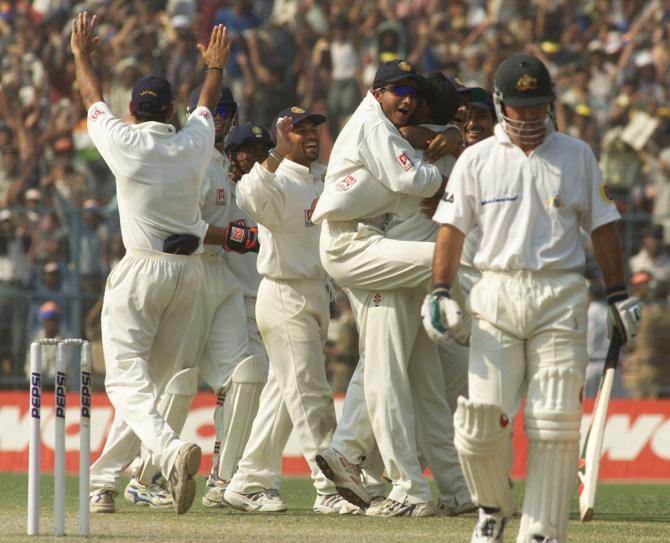
The abiding image from the 5th day, for me personally, is Venkatpathy Raju standing with his hands on his hips, after Justin Langer had whacked him over long-on, twice in two balls, to send out the message: 'Jaded muscles and jangled nerves aside, we think 384 in 75 overs is gettable.'
Raju's reaction told us that he just couldn't decode the message. Perhaps the lanky spinner didn't understand messages when they conveyed suicidal tendencies.
After all, the generation that he came from saw survival as the key to future greatness.
Raju may not have understood it then, but we can now.
Despite all our bad habits, we Indians value immensely the idea of modesty. And so, the notion of letting the dark night pass in hope of the clear dawn that might soon arrive appeals to us in a religious sort of way.
But if we were to temporarily do away with this disproportionate admiration for modesty, we would see that it was Australia's complicated relationship with success, their innate immodesty, and their unwillingness to be tame that made possible our most famous Test Match victory.
Not taking anything away from Laxman, Harbhajan, and Dravid, but the outcome of that game owed a good deal to the Aussies' reluctance to play for a draw.
Even the mini collapse that happened in the final session (7 Australian wickets fell post tea) can, I think, be attributed to an abrupt change in mindset.
Ponting, Gilchrist, Warne, and Hayden perished to Harbhajan and Tendulkar, in the space of five overs, but the manner of their dismissals, the awkwardness with which they went for their shots, suggested that a team which had its sights set on achieving the impossible had suddenly been briefed on the virtues of 'going easy'.
In addition to being the most successful bunch in cricketing history, Australia, even in their defeats, has given cricket some of its most exciting duels (Just from the last 20 years: The 2001 series; the 2005 Ashes; South Africa chasing down 434; the 2019 Ashes; the 2021 series with India).
That's an interesting trend.
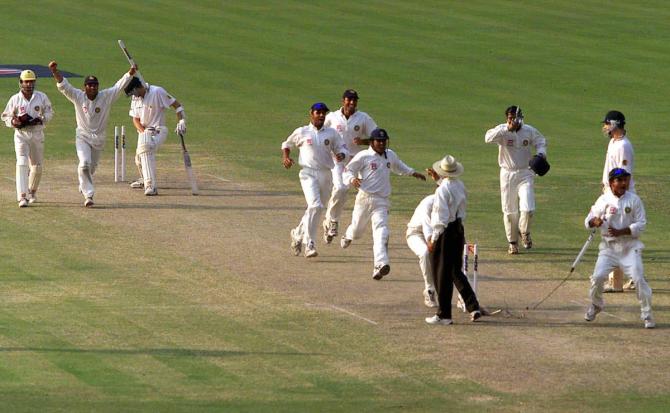
Surely power being addicted to more power has something to do with it. But there's more.
For when a team proceeds with all its extraordinary arrogance to say, 'We are the champions until somebody knocks us down', what they are doing is advancing the game, making it a rallying cry for the ambitious.
A lot was made about how India's recent series win Down Under was an enterprise led by simple, sincere, men.
The evaluation is part of a long-standing effort to restore cricket's status as a Gentleman's Sport.
Beyond such sober analyses, however, is the plain truth: That the quintessence of modern-day cricket has been provided *not* by a country known for its genteel tea-parties, but by a country of convicts.
That last fact may hurt many a pacifist homebody, but I for one believe that this game is all the richer for those men who inject into it colour and vitality, sometimes as obvious champions and sometimes as egotists, madmen, hoodlums, as those cheats who try to pinch a run here, pinch a wicket there.
I hope Cricket Australia never becomes so corporate-driven as to turn the Australian way of playing cricket into a model for sensible thinking.
Sensible minds may bring in regularity, security, calm, but they hardly ever change the course of history.
History is made by those whose ambitions overtake their good sense. It is they who make the world go round. It is they who make it interesting.
Feature Presentation: Rajesh Alva/Rediff.com

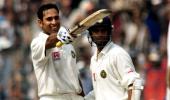









 © 2025
© 2025